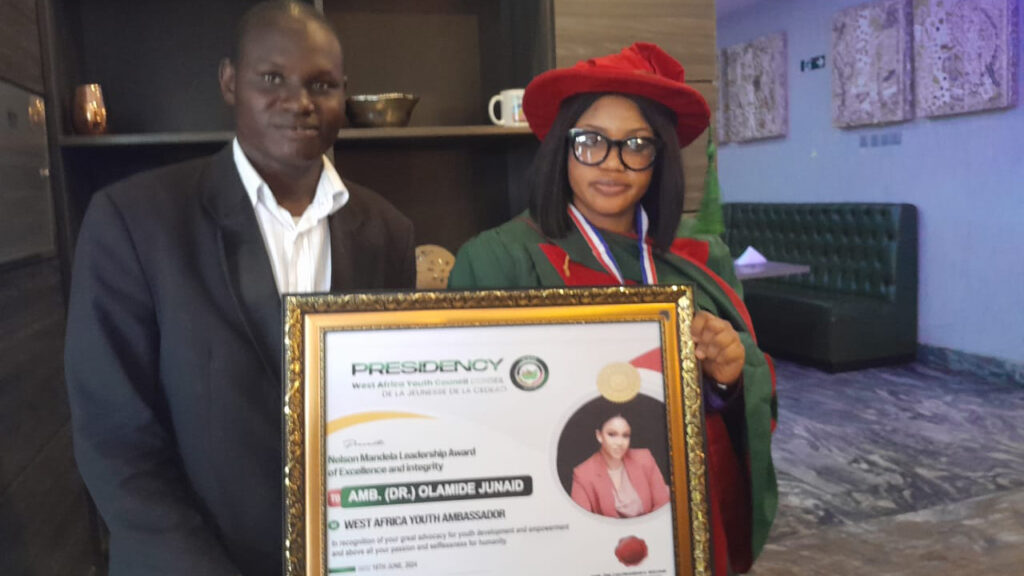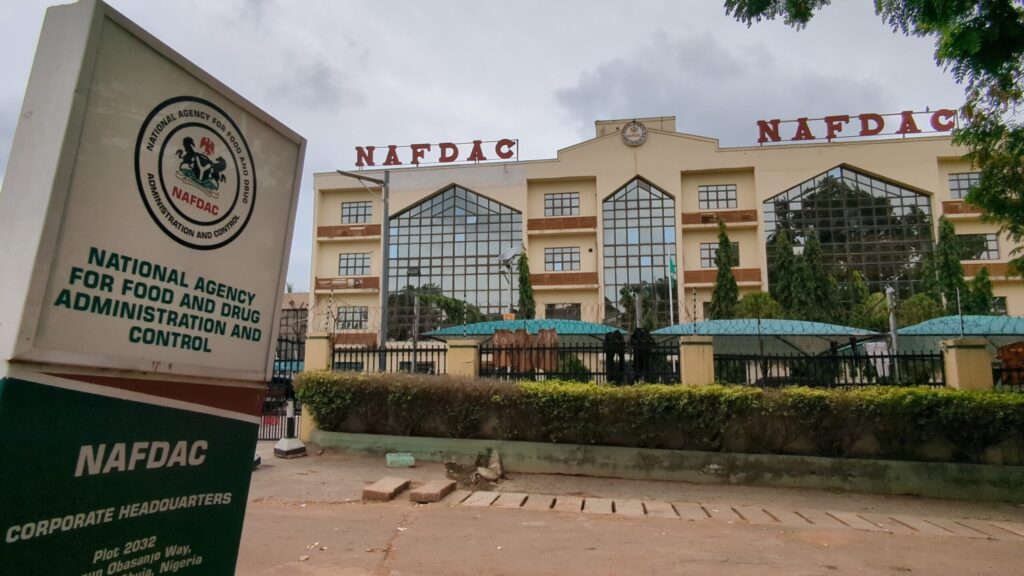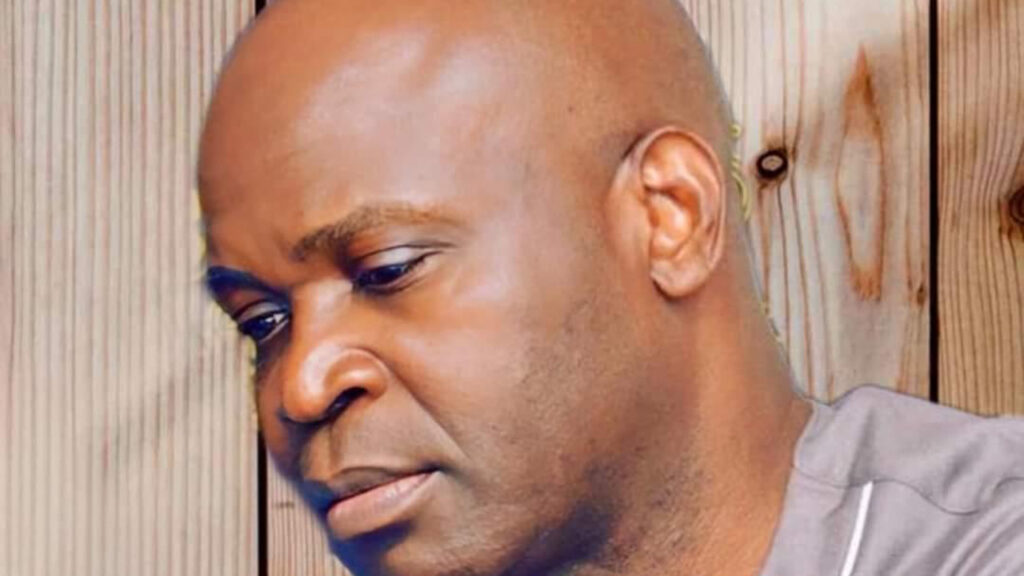
Decked in flowing white attire accessorised with a white neck, leg, and hand beads, as well as white shoes, a middle-aged lady intermittently accosted passers-by soliciting money.
As she approached each passer-by around Mushin Bus Stop, some of whom were thoroughly agitated, the alleged Osun devotee either stretches out her hands to receive the money or puts forward a white beaded calabash, mutter what sounds like incantations, as they solicit for cash.
Of late, locations like Mushin, Ikorodu, Lagos Island, Igando, Ipaja, Ejigbo, and Oshodi just to mention a few, have become choice spots for these Osun Orisa worshippers, who sometimes tag along with equally dressed teens that are also engaged in soliciting for alms.
Ọṣun is a female orishá adopted and worshiped in all Afro-Brazilian religions. She is the orishá of the freshwater of rivers and waterfalls; of wealth and prosperity; of love; and beauty. Followers seek help for romantic problems from Osun; the orisha is also responsible for marriage and other relationships.
Also associated with purity, fertility, love, and sensuality, Osun Orisa is considered one of the most powerful of all orishas, and, like other gods, she is said to possess human attributes such as vanity, jealousy, and spite.
However, several myths exist about Osun Orisa and her significance as a Yoruba deity. In most Yoruba stories, Osun Orisa is generally depicted as the protector, saviour, or nurturer of humanity aside from being described as the maintainer of spiritual balance or mother of sweet things.
One myth highlights Osun Orisa as the central figure in the creation of human beings, the reason the Yoruba people believe that the orishas were sent by Olodumare, considered the Supreme God, to populate the Earth.
It is also recorded that Osun Orisa was one of the original 17 sent to the earth by Olodumare and the only female deity.
The other gods, all male, were said to have failed in their attempts to revive and populate the earth. So, when they realised they were unable to complete the task given to them by Olodumare, they tried to persuade Osun to help them.
It is further chronicled that Osun agreed and brought forth her sweet and powerful waters, bringing life back to earth and humanity and other species into existence. As the Yoruba myth submits, humanity would not exist if Osun, the goddess of life and fertility, had not acted.
Also, history has it that the first interaction between Osun Orisa and human beings took place in Osogbo. This is probably why the Osun Festival is celebrated in Osogbo, Osun State, yearly.
The seeming bastadisation of culture is not limited to those who claim to be Osun worshipers. Masquerades and masquerading are rooted in the culture and traditions of the different tribes in Nigeria, and they are all different from each other in terms of functions and festivals.
In Yoruba land, they are known to appear and perform during festivals, rituals, funerals, or special events. This explains why they are a part of Yoruba tradition passed down from one generation to another.
In the South West region, some families are known to be a lineage of masqueraders. And masquerades are believed to have spiritual powers and the mask and clothes are seen as totem objects, which shouldn’t be touched by “ordinary human beings.”
There is also another belief that they are ancestors’ representatives.
But surprisingly, these days, in many communities in Lagos State, some “masquerades” sole occupation is forceful demand for money from members of the public. Failure to yield to their demands is always visited with subtle hostility, and even flogging.
These unfortunate developments have irked several residents, who frown at the continuous bastardisation of culture and tradition.
According to a resident, Abidemi Kayode:
“Whenever I run into people like that, I feel ashamed as a Yoruba person because it does not paint us in good light as a people. I am a Christian and do not believe in idol worship, but be that as it may, these people should dignify whatever they worship.
“To non-Yoruba, it is seen more as culture and tradition than religion. To these outsiders, the whole Yoruba race would be tarred with the same brush because of the activities of these fake worshippers. This is why I feel that traditional rulers in Lagos should do something to stop or eradicate this practice in the state,” Kayode said, who believes that true devotees should rise to defend what they believe in, by collaborating with other stakeholders to put an end to the illegality.
“This is important so that many would not erroneously hold the view that begging is an integral part of our tradition or culture.”
Commenting on the issues, a professor of Yoruba Literature and Culture at the Obafemi Awolowo University, Ile-Ife, Ajibade George Olusola, said: “It is not a product of a sound tradition that some persons are roaming around the streets begging for money in traditional worshippers’ attires. But just as we have in some other religions where some worshippers are concerned with money-making using religion as a vehicle, this has led to having many fake adherents. The traditional Yoruba religion has been caught in the same web.
“There are no gods that instruct their worshippers to be begging for money. However, there are instances where parents who gave birth to twins may have consulted an oracle that would have instructed them to move about town dancing with their babies.
“It is a basterdisation of culture and tradition for citizens to dress as Osun adherents and be begging for money, imploring residents to give the gods money or gifts. No gods would send anyone out to do that; those doing it are doing it for survival purposes,” he insisted.
Olusola further said that the gods could have a message for a person, a community, or its leaders, adding that in such instances, the messengers are not even compelled to dress in their costumes.
“If any of the devotes or messengers are fully dressed in their costumes, it is usually to places where they are not known as worshippers of these gods. So, they are expected to put on their regalia so that they can be listened to, and accepted.”
On whether the government can clamp down on such practices, he said that there is nothing much that a government can do to curb the illegality, especially if the actions of the fake devotes do not disturb the peace of the community.
“Many residents are not bothered even when they know that what these alleged devotees are doing is wrong because Nigeria seems to be a lawless state. It is the same way that residents see thieves but look away. The challenge is that the true adherents and traditional rulers who should have stood up for what they believe in, for tradition, and culture have failed to do so.
“If they see it as rubbing off negatively on the image of the Yoruba, they would find a means to stop it,” Olusola maintained.
He, however, implored those engaging in the debasing practice to desist from such representation of traditional religion. “They should know that if they are apprehended by true worshipers, they might face the wrath of the law. They should stop the nonsense they are doing.”
Also, an Isese adherent, Omitonade Ifawemimo, maintained that many of those seen outside dressed as Osun worshippers are not true adherents, but survivalists.
“They are not Isese practitioners and are not Osun worshippers. Traditionally, the gods could send out some worshippers to take gifts from members of a community, but they are not to beg, usually, they are expected to seat somewhere within the community praying and blessing passersby.
“Pedestrians who feel led to give something could then offer a gift to the devotees or messengers. But many on the streets today forcefully demand money from residents and sometimes when the people fail to offer them money, they rain abuses on them. These people are fake worshippers. This should not be. The real traditional worshippers and messengers of the gods will not toe the line of abusing or forcefully demanding money from passersby at all.
“If you come across true worshippers and those sent by the gods in the community, you would gladly give them gifts because of the way they are dressed and carry out their assignment. What many do not understand is that even those sent by the gods to take gifts are not doing so for personal gains, as they are expected to go to the shrine, where the money and gift would be used as a means of contact to offer more prayers to the donors. And the money is used to buy things for the rites. The gods will not send children who are supposed to be in school to go out to take gifts, it’s only mature adherents that are sent out.”
Ifawemimo stated that true devotees are not sent out every day. “It is once in a while. It could be once, twice, or three times in a year. It depends on the circumstance.”
Also commenting, the Onigando of Igando, Oba Lasisi Gbadebo Gbadamosi, said that the way some of the women go about begging in white apparel is not right, maintaining that those who want to be beggars should do so without using culture as a tool to carry out alms soliciting.
He stated that those engaging in the act were not painting the culture right.
Kings are custodians of culture and tradition within communities. Asked if he is not bothered about this illegality being perpetrated in Yoruba land, he promised to raise the issue at the next meeting of traditional rulers in the state so that something could be done collectively on the matter.
“It is not right, if you want to beg, do not beg using culture and tradition. It is bad,” Gbadamosi said.











